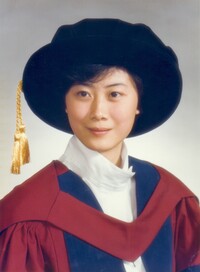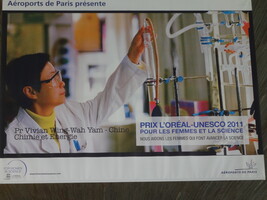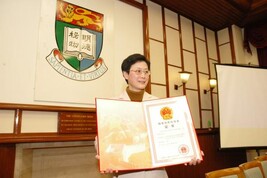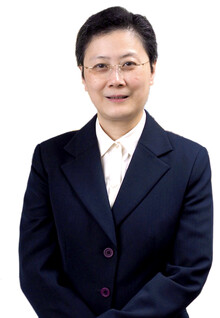Professor Vivian Wing-Wah YAM
Philip Wong Wilson Wong Professor in Chemistry and Energy
Chair Professor of Chemistry
Research interests: Inorganic and Organometallic Chemistry, Supramolecular Chemistry, Photophysics and Photochemistry, Molecular Functional Materials for Optoelectronic and Solar Energy Conversion, etc.
Research achievements: Molecular design and spectroscopic studies of luminescent molecular functional materials and supramolecular assemblies, particularly in the manipulation and harnessing of excited states for light-enabled technologies and functions.
What makes a great scientist and influencer? Since she was a child, Professor Vivian Wing-Wah Yam has been contemplating the connection between science and nature. Back in primary school, she observed the liquid state of mercury from a broken thermometer and was fascinated by how unique it was compared to other metals. This proved to be a pivotal moment for her, as it led to her life-long passion for chemistry. ‘I have always been observant and tend to see things objectively. As a scientist, this has been very useful for my research,’ Professor Yam noted.

Professor Yam values creativity in chemistry, as it allows her to experiment with new molecules and better understand the functions of existing ones. ‘As a central science, chemistry forms a very good foundation for applying to other fields, for example, one can work at the interface of chemistry, physics and engineering to develop new materials to combat environmental and energy-related issues,’ she explained. She also mentioned the close connection between chemistry, biology, and medicine for developing new drugs, vaccines, and diagnostic tools for biomedical applications.
Born and raised in Hong Kong, Professor Yam attended an Anglican grammar school, where she began to develop her curiosity about the natural world. As a gifted learner, she could excel in areas that pushed her analytical skills, which encouraged her to pursue science. ‘When I was at secondary school, I developed a strong sense of feeling for the need to value and respect one’s own doing and work, the importance of taking on the ownership, while enjoying with full commitment and dedication to everything you choose to do in life,’ she said. Years later, she graduated from Chemistry at The University of Hong Kong, receiving her BSc (Hons) in 1985 and PhD in high-valent metal-oxo chemistry in 1988.
The rough sea makes a good sailor
‘Being a scientist is not for the faint-hearted,’ Professor Yam said with a smile. ‘Being passionate, dedicated, determined, and a person with the drive for the pursuit of scientific rigour are of utmost importance,’ but she also supplemented that ‘obstacles would inevitably arise when you push the boundaries of science and discovery’. One such challenge is the ongoing global energy crisis. Developing suitable materials to combat this issue requires concerted efforts from chemists, physicists, and engineers. Nevertheless, Hong Kong’s scientific community is relatively small, so its resources and expertise are limited in certain areas. ‘This is why both national and international collaborations are vital as they can harness multidisciplinary expertise nationwide and worldwide, which will open up an excellent platform for knowledge exchange and discussion.’

Looking back at her career, the Government in the 1980s was yet to establish its Research Grants Council (RGC), which eventually was realised in the early 1990’s. Before the establishment of the RGC, it was mainly the Croucher Foundation that had the vision to fund STEM research and PhD students and postdocs in the 1980’s. In those days, most of the chemicals for her research could not be transported by plane both because of the cost and for safety reasons. Instead, chemicals would often arrive months to more than half a year later by ship, forcing her and other scientists at the University to be very careful about scheduling their experiments. Professor Yam remarked, ‘Despite these setbacks, one needed to stay positive and to work within the limited resources available and the restrictions that one had.’
From appreciation to life-long passion
Professor Yam sees chemistry as a constantly evolving area that keeps her mind occupied. She is always thinking about the next breakthrough in her field, whether it is the understanding of how existing molecules work or the creation of new molecules with new functional properties. ‘Failed experiments are unavoidable for scientists, but learning from failure is the key and does ignite your desire to find solutions and take your research to the next level. This is a life-long self-learning process, and one should never be complacent and stop learning. As such, my passion for chemistry has an endless supply of inspiration,’ she depicted.
Never let circumstances define you

As a woman scientist, setting an example for other female scientists is something that Professor Yam has always valued. Nonetheless, regardless of gender, race, religion, or any other label, she strongly believes that intellectual ability and research capability come down to the individual. ‘If you are passionate, dedicated, and believe in yourself, you can excel at anything. This might even result in you producing something that could change the world,’ she said. The pressure and social values that the society places on women, especially in terms of taking on specific roles, has definitely led some women to give up their dreams. However, Professor Yam is a firm believer in being committed to her journey and encourages others to look beyond the society’s traditional expectations on women.
A break away from bustle and hustle
Everyone needs a moment of revitalising rejuvenation. Professor Yam revealed her refreshing routine and little secret of time management, ‘I work long hours but try to be as efficient and focused as possible. As I need to do multiple tasks, often requiring me to switch between tasks quite abruptly because my schedule is often full throughout the day, I need to stay very focused and can switch from task to task quite quickly.’ This has been the case throughout her career, and as a scientist, she values the importance of staying at the forefront to ensure that her research is always moving forward. As with any highly-skilled profession, it is vital to be aware of finding the right balance between work and home. As a dedicated sportswoman who used to play for her secondary school’s and HKU’s badminton teams, she now enjoys the relatively rare rounds of games with her family on weekends. ‘Going for sports with my friends and family is also something that I have always enjoyed, as it gives me time to reflect on life and plan for the future, especially the team spirit and the stamina needed for sports and competitions are essential elements of a scientist,’ she added.
Pushing the boundaries of science frontiers
Professor Yam is a leading expert in molecular design and spectroscopic studies of luminescent metal-based molecular functional materials and supramolecular assemblies. Within this field, she is particulary interested in developing light-emitting supramolecular materials and materials for organic light-emitting diode technologies and functions. ‘I am currently working with my research team to develop novel photoactive materials that are based on metal-organic compounds. We are working towards developing new metal-ligand chromophores and luminescent metal complexes that can absorb and emit light at different wavelengths and efficiencies. In particular, we are very interested in the control of the excited state properties and the control of how molecules pack and align themselves in the materials, which consist of large assemblies and ensembles of molecules, that can lead to innovative materials with desirable functional properties by design,’ she concluded. Indeed, discovering new classes of light-enabled materials is a crucial aspect of developing new excited-state materials and is at the forefront of energy research for organic light-emitting diode technology.

 As a woman scientist, setting an example for other female scientists is something that Professor Yam has always valued. Nonetheless, regardless of gender, race, religion, or any other label, she strongly believes that intellectual ability and research capability come down to the individual. ‘If you are passionate, dedicated, and believe in yourself, you can excel at anything. This might even result in you producing something that could change the world,’ she said. The pressure and social values that the society places on women, especially in terms of taking on specific roles, has definitely led some women to give up their dreams. However, Professor Yam is a firm believer in being committed to her journey and encourages others to look beyond the society’s traditional expectations on women.
As a woman scientist, setting an example for other female scientists is something that Professor Yam has always valued. Nonetheless, regardless of gender, race, religion, or any other label, she strongly believes that intellectual ability and research capability come down to the individual. ‘If you are passionate, dedicated, and believe in yourself, you can excel at anything. This might even result in you producing something that could change the world,’ she said. The pressure and social values that the society places on women, especially in terms of taking on specific roles, has definitely led some women to give up their dreams. However, Professor Yam is a firm believer in being committed to her journey and encourages others to look beyond the society’s traditional expectations on women.
